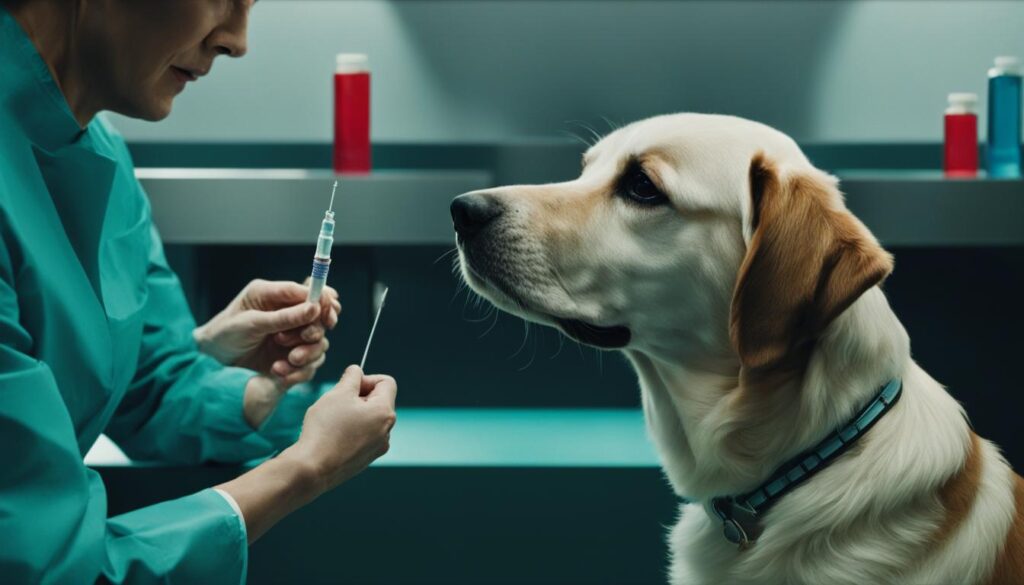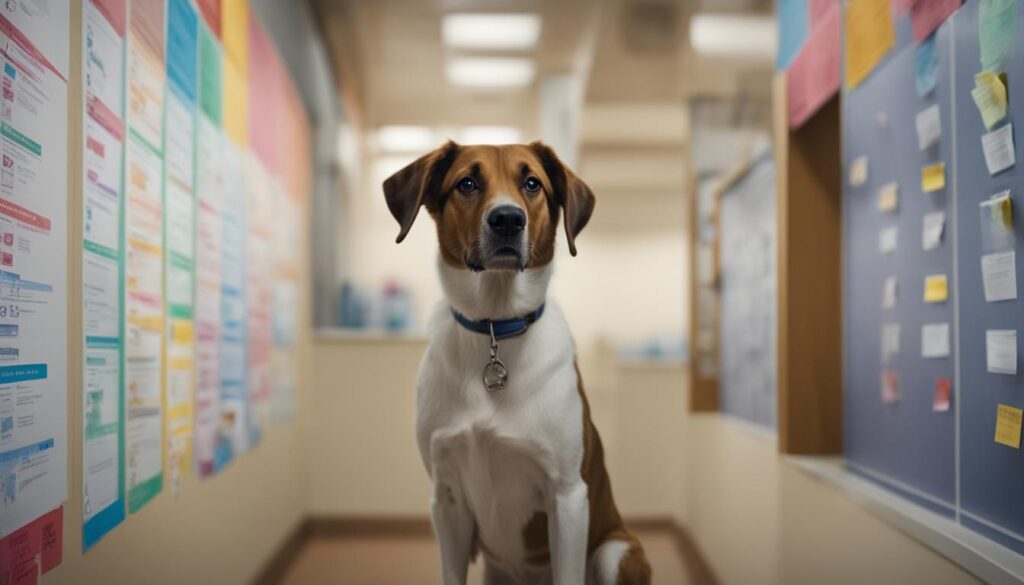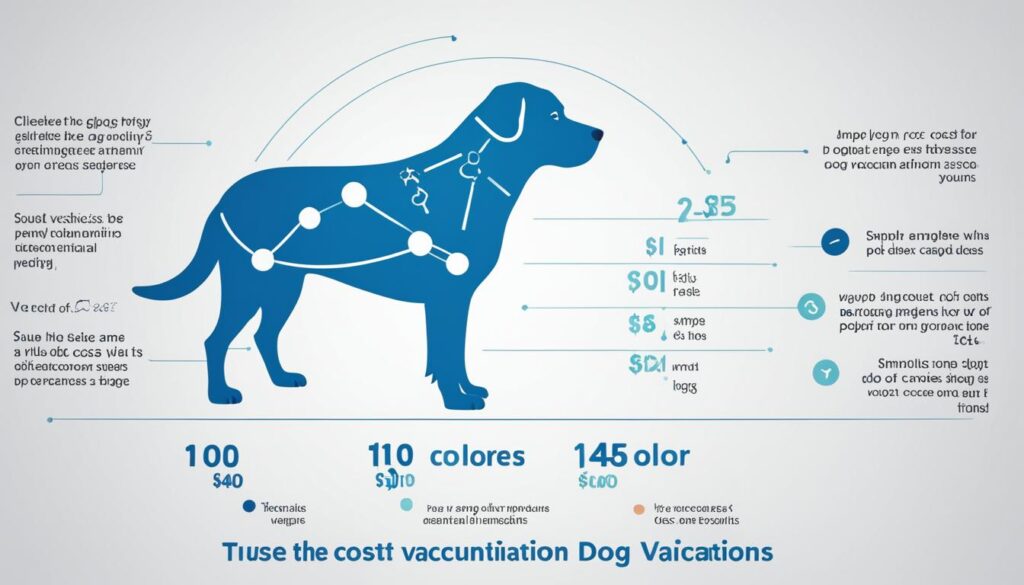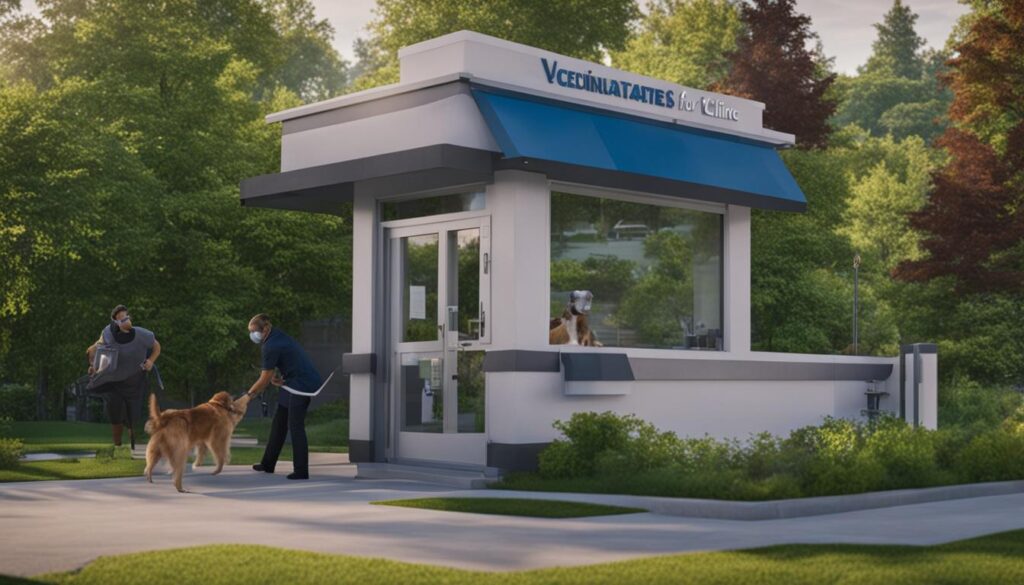When it comes to keeping our furry friends healthy, vaccinations play a crucial role. They not only protect dogs from potentially life-threatening diseases but also help prevent the spread of infectious illnesses in the canine community. However, many pet owners may wonder about the cost of dog vaccinations and what factors determine their prices.
The cost of dog vaccinations can vary depending on various factors, such as the type of vaccine and the overall veterinary fees in your area. On average, dog vaccinations can range from $20 to $50 each. It’s important to note that vaccines are usually administered during your dog’s annual wellness visit, so the total cost may include an exam fee and will depend on the number of vaccines your dog receives.
It’s worth noting that puppies receive temporary protection against infectious diseases through antibodies passed on from their mother’s milk. However, this protection diminishes after a few weeks, making vaccinations essential for their overall health. Puppy vaccinations typically start around 6 to 8 weeks of age, with multiple doses given every two to four weeks until they reach 16 weeks, allowing them to develop their own immune response.
Key Takeaways:
- The cost of dog vaccinations can range from $20 to $50 each, depending on factors such as vaccine type and veterinary fees.
- Vaccinations are typically administered during a dog’s annual wellness visit, which may include an exam fee.
- Puppies receive temporary protection against diseases from their mother’s milk, but vaccination is necessary to develop their own immune response.
Core Vaccines for Dogs

Core vaccines for dogs are essential to ensure their health and protect them from fatal diseases. These vaccines not only safeguard the well-being of our pets but also contribute to preventing outbreaks and safeguarding the entire community.
There are several core vaccines that are considered necessary for all dogs:
- Canine Parvovirus Vaccine: This highly contagious disease can lead to severe dehydration and systemic infection in dogs. Vaccination provides crucial protection against it.
- Distemper Vaccine: Distemper is a devastating disease that attacks the nervous system and respiratory tract in dogs, often causing permanent damage and even death.
- Canine Hepatitis Vaccine: Hepatitis targets the liver cells and can result in clotting problems or kidney disorders. It carries a mortality rate of around 10% to 30% in infected young dogs.
- Rabies Vaccine: Rabies is nearly 100% fatal and is required by law to protect both pets and humans from infection. It is crucial to ensure the safety and well-being of everyone.
By administering these core vaccines, we provide our dogs with the necessary protection against these life-threatening diseases, allowing them to lead healthy and happy lives.
The Importance of Core Vaccines for Dogs:
“Core vaccines for dogs are vital for protecting our pets from fatal diseases and preventing the spread of infections. By ensuring our dogs receive these vaccines, we prioritize their health and well-being while also safeguarding the community.”
It is important to consult with a licensed veterinarian who can provide expert guidance on the appropriate core vaccines for your dog. They will take into account factors such as your dog’s age, overall health, and lifestyle to determine the optimal vaccination plan.
The 5-in-1 Vaccine

The 5-in-1 vaccine for dogs, also known as the DAPP, DHPP, DA2PP, or DAPP+L vaccination, combines multiple core vaccines into a single injection. This innovative approach streamlines the vaccination process, providing comprehensive protection against multiple diseases in dogs.
The 5-in-1 vaccine safeguards dogs against canine parvovirus, distemper, adenovirus, and canine parainfluenza. By bundling these core vaccines together, veterinary clinics reduce the number of injections required, minimizing stress for dogs and simplifying the vaccination process for pet owners. Moreover, the combined vaccine ensures that dogs receive the necessary protection against these deadly diseases.
Benefits of the 5-in-1 Vaccine
The 5-in-1 vaccine offers several advantages over individual core vaccines:
- Simplified vaccination process: Instead of scheduling separate appointments for each core vaccine, pet owners can administer the 5-in-1 vaccine in a single visit.
- Reduced stress for dogs: Dogs appreciate fewer needles and a shorter vaccination experience.
- Cost-effective solution: The combined vaccine is often more affordable than purchasing each core vaccine separately.
- Comprehensive protection: The 5-in-1 vaccine shields dogs against multiple diseases, ensuring their overall well-being and longevity.
By opting for the 5-in-1 vaccine, dog owners can conveniently protect their pets against canine parvovirus, distemper, adenovirus, and canine parainfluenza in a single, efficient vaccination.
Now that we’ve explored the benefits of the 5-in-1 vaccine, let’s move on to discussing optional dog vaccines.
| Vaccine | Components |
|---|---|
| Canine Parvovirus | Protection against parvovirus |
| Distemper | Protection against distemper |
| Adenovirus | Protection against hepatitis |
| Canine Parainfluenza | Protection against parainfluenza |
Optional Dog Vaccines

Optional dog vaccines, also known as lifestyle or non-core vaccines, are administered only to dogs at high risk for contracting specific diseases. These vaccines are assessed during puppyhood and reevaluated during annual wellness visits. Optional vaccines for dogs include:
- Bordetella vaccine: Protects against kennel cough, recommended for dogs in group settings.
- Canine influenza vaccine: Protects against airborne infection and is recommended for dogs at risk for Bordetella infection.
- Leptospirosis vaccine: Protects against a bacterial disease transmitted through contaminated water sources.
- Lyme disease vaccine: Protects against the tick-borne disease caused by Borrelia burgdorferi.
Optional dog vaccines provide additional protection against specific diseases that may be prevalent in certain environments or situations. It is important to consult with your veterinarian to assess your dog’s risk factors and determine if these vaccines are recommended for your pet.
Puppy Vaccination Schedule
A typical puppy vaccination schedule is crucial for ensuring the health and well-being of your new furry friend. By following the recommended puppy vaccine ages, you can protect your puppy from potentially life-threatening diseases.
When to vaccinate puppies is a common concern for many new pet parents. Vaccinations generally start around 6 to 8 weeks of age when a puppy starts to lose the temporary protection provided by their mother’s antibodies. From this point, vaccinations are typically administered every two to four weeks until the puppy reaches 16 weeks of age.
The specific puppy vaccination schedule may vary based on factors such as the puppy’s breed, health condition, and potential exposure to diseases. It is essential to consult with your veterinarian to determine the best vaccine schedule for your puppy.
Recommended Puppy Vaccine Ages:
- First round of vaccines: 6 to 8 weeks
- Second round of vaccines: 10 to 12 weeks
- Third round of vaccines: 14 to 16 weeks
By following the recommended puppy vaccination schedule and ensuring your puppy receives all the necessary vaccines, you are providing them with vital protection against diseases. Vaccinations help to strengthen your puppy’s immune system and safeguard their health as they grow into adulthood.
Remember, always consult with your veterinarian to determine the best vaccination schedule for your puppy. They will be able to assess your puppy’s individual needs and recommend the appropriate vaccines to keep them happy and healthy.
Adult Dog Vaccination Schedule

After the initial puppy vaccination series, adult dogs require regular booster shots throughout their lives. Booster shots help reinforce the immune system’s response to the targeted diseases and ensure long-term protection for your furry friend. The frequency of dog vaccinations varies depending on the specific vaccine and the manufacturer’s recommendations.
Core Vaccines
Core vaccines, such as canine distemper, parvovirus, and rabies vaccines, are typically boosted one year after the completion of the initial puppy vaccination series. After the initial booster, some core vaccines are given every three years, while others may require yearly boosters.
Optional Vaccines
Optional or lifestyle vaccines, like those for bordetella (kennel cough), canine influenza, leptospirosis, and lyme disease, may also require regular boosters. The frequency of booster shots for these vaccines can vary depending on your dog’s risk factors, geographical location, and lifestyle.
Consult Your Veterinarian
It’s essential to consult with your veterinarian to determine the appropriate adult dog vaccination schedule for your pet. They will consider various factors, including your dog’s age, health status, lifestyle, and local disease prevalence, to tailor a vaccination schedule that provides optimal protection.
Remember, keeping your adult dog up to date with vaccinations is crucial to ensure their well-being and protect them from preventable diseases. Regular booster shots are an essential part of responsible pet ownership.
Are Dog Vaccinations Required?
Rabies vaccination is required by law in the United States and is regulated by individual states and counties. Each county legislature sets rabies control laws, and the animal control department enforces these laws. Rabies is a deadly disease that can be transmitted from animals to humans, making vaccination crucial for both pet and public health.
While rabies vaccination is the only legally required dog vaccine, other vaccinations are not mandatory by law. However, core vaccines, including distemper, hepatitis, parvo, and rabies, are highly recommended by veterinarians to protect the health and well-being of pets and the community.
Core vaccines provide protection against severe and often fatal diseases that can spread rapidly among dogs. By vaccinating your dog, you not only safeguard their health but also contribute to the prevention of outbreaks in the canine population.
It is important to consult with your veterinarian about the legal requirements and recommended vaccinations for your specific location. Veterinary professionals are well-versed in local regulations and can provide guidance on the necessary and recommended vaccinations for your dog’s well-being.
By ensuring your dog receives the appropriate vaccinations, you are taking proactive steps to protect their health and prevent the spread of contagious diseases. Vaccinations play a vital role in keeping dogs healthy and happy while promoting overall public health.
Summary of Dog Vaccination Costs

Dog vaccinations are an important aspect of responsible pet ownership, providing protection against various diseases. While costs can vary depending on factors such as location and veterinary fees, it is helpful to have a general idea of the average costs associated with different dog vaccines. Here is a breakdown of the average costs for popular dog vaccines:
| Vaccine | Cost Range |
|---|---|
| Rabies vaccine | $23 to $27 |
| DAPP vaccine | $33 to $38 |
| Leptospirosis vaccine | $20 to $24 |
| Lyme vaccine | $36 to $41 |
| Bordetella vaccine | $28 to $33 |
| Canine parainfluenza and influenza vaccines | $45 to $52 |
Please note that these costs are only intended to provide a general range and may vary based on factors such as geographical location and individual veterinary fees. It is essential to consult with your veterinarian for accurate and up-to-date pricing information for dog vaccinations.
Keeping your dog’s vaccinations up to date is crucial for their health and well-being. While the costs can add up, the investment in preventive care can help prevent expensive treatments for vaccine-preventable illnesses down the line. Remember, the value of dog vaccinations extends beyond just the cost; they provide invaluable protection for your beloved four-legged friend.
How To Lower the Cost of Vaccines for Dogs
Pet parents can take several steps to lower the costs of dog vaccinations and ensure their furry friends receive the necessary protection against diseases. Here are some strategies to consider:
1. Adopt from Shelters or Rescues
Consider adopting a puppy from a reputable shelter or rescue organization that includes vaccinations in the initial adoption fee. This can significantly reduce the upfront cost of vaccinations and provide a loving home to a deserving dog.
2. Visit Low-Cost Vaccine Clinics
Many communities offer low-cost vaccine clinics where pet owners can receive discounted vaccinations for their dogs. These clinics are often run by nonprofit organizations or veterinary schools and provide necessary vaccines at a more affordable price.
3. Reevaluate Vaccine Risks
Work closely with your veterinarian to reevaluate your dog’s vaccination needs each year. Some vaccines may be deemed less necessary based on factors such as your dog’s lifestyle, location, and exposure risks. By reevaluating vaccine risks, unnecessary vaccinations can be avoided, effectively reducing costs.
4. Consider Vaccination Packages
Some veterinary clinics offer vaccination packages that bundle multiple vaccines together at a discounted price. These packages can be a cost-effective way to ensure your dog receives all the necessary vaccines while saving on overall costs.
5. Explore Pet Insurance Options
Consider purchasing pet insurance that includes coverage for vaccines through wellness plans with routine care coverage. Pet insurance can help offset the costs of vaccinations and other preventive care services, providing peace of mind and financial support for your pet’s health needs.
“By adopting a puppy from a shelter, pet parents can provide a loving home while also saving on initial vaccination costs.”
By implementing these strategies, pet parents can lower the cost of vaccines for their beloved dogs without compromising their health and well-being. It’s important to prioritize vaccination to protect dogs from preventable diseases and ensure their long and happy lives.
| Strategy | Benefits |
|---|---|
| Adopt from Shelters or Rescues | Reduced upfront vaccination costs |
| Visit Low-Cost Vaccine Clinics | Discounted vaccinations for dogs |
| Reevaluate Vaccine Risks | Avoid unnecessary vaccinations |
| Consider Vaccination Packages | Bundled vaccines at a discounted price |
| Explore Pet Insurance Options | Financial support for vaccine costs |
Where to Get Dog Vaccinations

When it comes to getting your dog vaccinated, there are a few different options available. The most common choice is to visit a licensed veterinarian who can provide the recommended and optional vaccines for your furry friend. Veterinarians have the expertise and knowledge to ensure that your dog receives the appropriate vaccinations to protect against diseases.
If cost is a concern for you, there are low-cost vaccination clinics or nonprofit organizations that may offer more affordable options. These clinics have licensed professionals who can administer the necessary vaccines at a reduced cost, making it easier to keep your dog protected without breaking the bank.
Another option to consider is pop-up vet care clinics that are sometimes offered at local retail pet stores. These clinics provide convenient access to licensed veterinarians who can administer vaccines and provide other essential healthcare services for your dog.
Additionally, pet insurance plans may include coverage for vaccinations, although typically only as part of optional wellness plans. Pet insurance can help offset the cost of vaccinations and other preventive care services, making it easier to provide your dog with the necessary medical care.
Overall, it’s important to choose a reputable and licensed provider for your dog’s vaccinations. Whether you opt for a licensed veterinarian, a low-cost clinic, or a pop-up vet care clinic, prioritize your dog’s health and well-being by ensuring they receive the necessary vaccines.
How Does Pet Insurance Help Pay for Vaccines?
Pet insurance can play a crucial role in alleviating the financial burden associated with dog vaccinations. While most standard pet insurance policies do not cover vaccinations, some providers offer optional wellness plans that include vaccination coverage. These plans provide reimbursement for a percentage of the costs of vaccinations and other preventive care services, ensuring that your furry friend receives the necessary protection they need to stay healthy.
By enrolling in a pet wellness plan, you can have peace of mind knowing that a portion of your vaccination expenses will be covered. In addition to vaccinations, these plans may also include coverage for annual wellness exams, heartworm prevention, flea, and tick prevention, allowing you to proactively manage your pet’s overall health and well-being.
Receiving vaccinations and preventive care is essential for your dog’s long-term health, as they help guard against various infectious diseases and prevent potential complications. However, the costs of these preventive measures can add up over time, making pet insurance with coverage for vaccinations and preventive care a valuable investment.
Here’s a breakdown of how pet insurance can help pay for vaccinations and preventive care:
| Benefit | Description |
|---|---|
| Reimbursement for Vaccination Costs | Pet insurance wellness plans typically provide reimbursement for a percentage of the costs associated with dog vaccinations. This can help offset the expenses and make it more affordable to keep your pet up to date on their vaccines. |
| Coverage for Preventive Care Services | Pet insurance wellness plans often include coverage for a range of preventive care services, such as annual wellness exams, heartworm prevention, flea, and tick prevention. These services further contribute to maintaining your pet’s health and preventing future health issues. |
With pet insurance, you can focus on providing the necessary preventive care for your dog without worrying about the financial implications. It allows you to prioritize your pet’s health and well-being without hesitation, ensuring that they receive the recommended vaccinations and preventive care measures they need for a happy and healthy life.
Wrapping Up
Ensuring the health of your dog is of utmost importance, and dog vaccinations play a crucial role in achieving this. Vaccinations protect your canine companion from serious and often fatal diseases, keeping them safe and healthy. Additionally, vaccinations help prevent the spread of infectious illnesses within the community, safeguarding not only your dog but also other animals and humans they come in contact with.
While the cost of dog vaccinations may vary, it is essential to prioritize this investment in your pet’s well-being. By visiting low-cost clinics and considering pet insurance plans with wellness coverage, you can minimize expenses without compromising on the quality of care. Regularly staying up to date with vaccinations ensures that your dog remains protected against preventable diseases, giving you peace of mind and preserving their overall health.
Remember, prevention is always better than cure. By taking proactive measures to vaccinate your dog, you are taking an active stance to safeguard their health and well-being. Maintain a regular vaccination schedule, consult with your veterinarian, and stay informed about the core and optional vaccines recommended for your dog. By prioritizing dog vaccinations, you are upholding your responsibility as a responsible and caring pet owner and ensuring a happy, healthy life for your furry friend.
FAQ
How much do dog vaccinations cost?
Dog vaccinations can range from $20 to $50 each, depending on the vaccine type and veterinary fees in your area. The total visit cost will depend on how many vaccines your dog receives during their annual wellness visit.
What are the core vaccines for dogs?
Core vaccines for dogs are considered necessary for all pets. They include the canine parvovirus vaccine, distemper vaccine, canine hepatitis vaccine, and rabies vaccine.
What is the 5-in-1 vaccine for dogs?
The 5-in-1 vaccine combines core vaccines into a single injection, providing protection against canine parvovirus, distemper, adenovirus, and canine parainfluenza.
What are optional dog vaccines?
Optional dog vaccines, also known as lifestyle or non-core vaccines, are administered only to dogs at high risk of specific diseases. These vaccines include the bordetella vaccine, canine influenza vaccine, leptospirosis vaccine, and Lyme disease vaccine.
When should puppies be vaccinated?
Puppies should start receiving vaccinations around 6 to 8 weeks of age, with doses given every two to four weeks until 16 weeks old.
How often do adult dogs need vaccinations?
Adult dogs need vaccine boosters throughout their lives. Core vaccines are typically boosted one year after the initial puppy series, and then either given every three years or yearly based on recommendations.
Are dog vaccinations required?
Rabies vaccination is required by law in most states and counties. Other dog vaccinations are not legally required but are highly recommended for pet and community protection.
How much do dog vaccinations cost on average?
The average costs for dog vaccines are as follows: Rabies vaccine: $23 to $27, DAPP vaccine: $33 to $38, Leptospirosis vaccine: $20 to $24, Lyme vaccine: $36 to $41, Bordetella vaccine: $28 to $33, Canine parainfluenza and influenza vaccines: $45 to $52.
How can I lower the cost of dog vaccinations?
There are several ways to lower dog vaccination costs, including visiting low-cost clinics, reevaluating vaccine risks, considering vaccination packages, and exploring pet insurance with wellness coverage.
Where should I take my dog to get vaccinations?
Most people take their dogs to licensed veterinarians for vaccinations. However, low-cost vaccination clinics, nonprofit organizations, and pop-up vet care clinics may also offer more affordable options.
How does pet insurance help pay for vaccines?
While most pet insurance policies do not cover vaccinations as standard, some companies offer optional wellness plans that include vaccination coverage. These plans reimburse a percentage of vaccination costs and other preventive care services.
What is the importance of dog vaccinations?
Dog vaccinations are essential for maintaining the health of your canine companion and preventing the spread of infectious diseases. They protect against often-fatal diseases and help protect the larger community from outbreaks.






